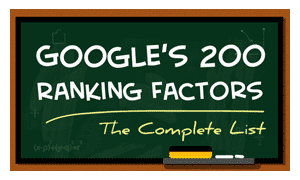
If you’re worried about your SEO, fear not, we’re here to point you in the right direction with some simple advice to get you started.
What makes SEO in 2013?
Despite the 200 factors looked at by Google for rankings there is no need to panic and try to do everything at the same time. The first thing to remember is that in 2013 there are 3 main elements you need to be considering for a complete SEO strategy:
Onsite SEO
This wide ranging term covers the SEO elements that you can optimise directly on your website, whether they are technical like site speed, robots.txt, URL structure, navigation or content / keyword related (metadata, keyword density, content layout and length).
From a work standpoint this is a priority as it is something that you should have full control of and that can bring some very quick wins. If you’re designing a new website or relaunching one, onsite SEO should be included in your development requirement to ensure you give yourself the best chance of ranking well shortly after launch for your chosen keywords.
Offsite SEO – Link building
This covers the SEO activities that cannot be controlled on your website, and more specifically the number of links to your website. In recent years link popularity has taken a lot more weight in the Google algorithm and as such it is extremely important to get your link strategy right. Always remember that what matters the most is not necessarily the total number of links to your website, but the actual quality of those links (judged by relevance, authority of the site linking to you) so stay clear of paid-for links, links from completely irrelevant websites or agencies offering you thousands of links from their own network of (shady) blogs.
Some of the best ways to get quality links back to your site are via guest posting on blogs, engaging in blogs and forums relevant to your particular industry and producing valuable content on your website that visitors will want to share and link to.
Social footprint – social signals
Google could not ignore the rise of social channels and in the past 2 years, some social factors have been included in the ranking algorithm. So it is worth considering at least 2 things for your business in your SEO plan:
- The creation and ongoing management of your own social channels to be able to syndicate content, engage in conversations with your target audience and increase your authority in the market. Consider Facebook, Google +, Twitter, LinkedIn and Youtube.
- Social signals – ensure that you allow your website and social channels visitors to engage with your content by giving them options to share, like, + 1 or follow. These social signals will be used as proof of relevance and authority in the market by Google
These 3 core elements of any SEO strategy should also be supported by a clearly defined content marketing strategy as content is still king for good rankings.
You’re probably realising by now that SEO is not only about what’s on your website anymore but involves a lot of other activities. many clients ask us for a magic formula that will deliver instant results and improved organic performance within days of starting work, but this, unfortunately, doesn’t exist (so don’t believe anybody who promises you number 1 positions in Google instantly).SEO was, is and will remain a long term strategy for a business, but the rewards are well worth the effort.
And if you need help with your SEO strategy, social media management or content marketing, get in touch and we’ll be happy to help.
About the author
Etienne is the Head of SEO here at Mahon Digital and he’s been involved in the digital & search marketing industry for nearly 11 years now, working for small family-owned businesses as well as international FTSE 500 companies. He’s passionate about all things digital, but more specifically about digital & search strategy and marketing analysis.




